Koalas and Eucalyptus Leaves
Koalas and Eucalyptus leaves are inseparable. In fact, the Eucalyptus leaves are the lifeline of the koalas and without them they may not be able to survive. Eucalyptus are the only leaves on which the koalas feed upon and there is hardly any good alternative to them. Both koalas and Eucalyptus leaves are native to Australian natural habitat within the Eastern region. The Eucalyptus leaves are present in great abundance at the Eastern forests of Australia.
Koalas and Eucalyptus leaves are inseparable. They are the only diet of the koalas and luckily they are found in great abundance in the Eastern regions of Australia.
Koalas have thrived and flourished within these eucalyptus forests for the millions of years. Today; koalas are believed to feed on almost 400 different types of eucalyptus species within the region. However; Manna Gums (Eucalyptus family) are the most common of them all and most preferable to the koalas diet as well. Keeping in mind the koalas' reliance on Eucalyptus leaves, any destruction of Eucalyptus will prove out to be the disaster for the koalas very existence on planet earth.
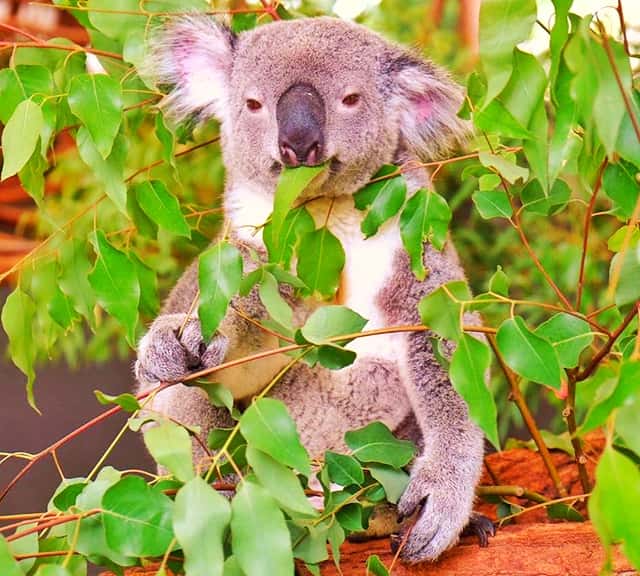
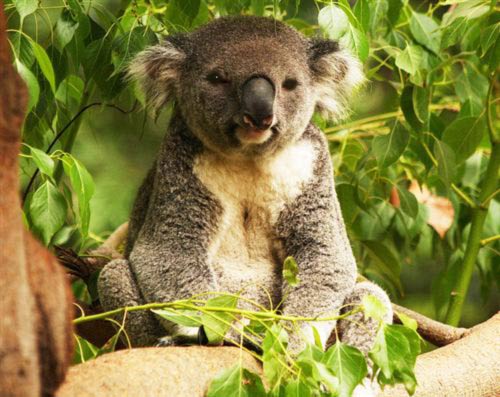
Let's break down the nutritional values and compounds which the eucalyptus leaves offer for the koalas as a diet. Eucalyptus leaves contain oodles of compounds which include water, proteins, cyanide compounds, tannins, fiber and scented oils etc. Some of these compounds are essential for the koalas while the others do seem to be toxic and poisonous. The presence of the water is one of the most essential compounds for the koalas and it is significantly present within the Eucalyptus leaves i.e., more than 61%.
Eucalyptus leaves contain oodles of compounds for the koalas. These compounds include water, fiber, tannins, proteins, cyanide compounds and scented oils.
Its significant presence allows the koalas to avoid drinking water from the waterholes and fulfill all their water requirements from the leaves. Other compounds such as proteins and fibers within the leaves offer nutrition and energy for the koalas while the remaining compounds are highly toxic and are of no use for the koalas but they still consume them.
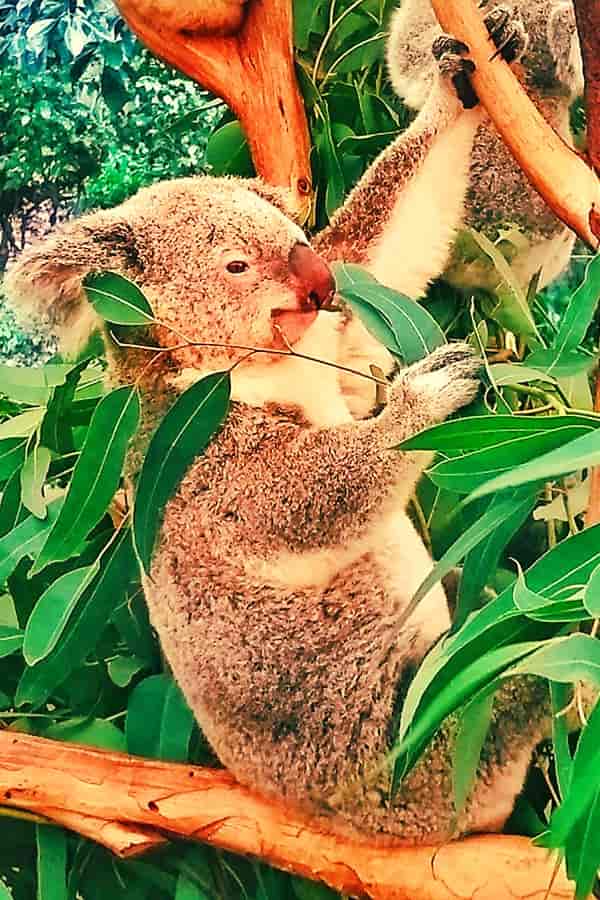
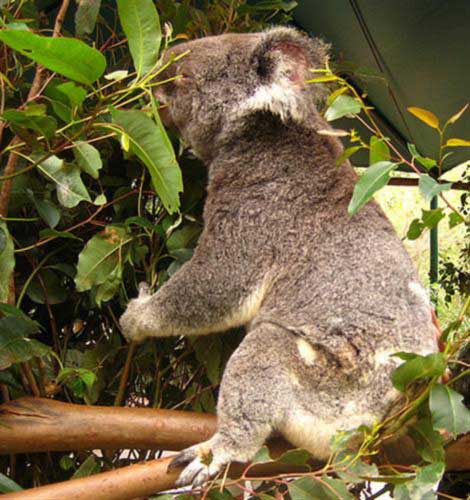
As mentioned earlier; the Eucalyptus leaves contain highly poisonous and toxic compounds within them and yet still koalas prefer to eat Eucalyptus leaves as part of their diet. Even the cyanide compounds within the Eucalyptus leaves can be extracted to produce the pure cyanide poison that can kill anyone. Surprisingly, these poisons and toxic compounds within the Eucalyptus leaves are not dangerous and life-threatening for the koalas.
Eucalyptus leaves are poisonous for almost all the other herbivores but surprisingly not for the koalas as they eat them on the daily basis.
Majority of other herbivores are unable to feed on Eucalyptus leaves. If they consume these leaves they may soon get sick or die within the days if not moments. On the other hand; koalas eat these toxic and poisonous leaves on the daily basis and they seem to extract nutrition from them which is truly an astonishing development for the researchers.
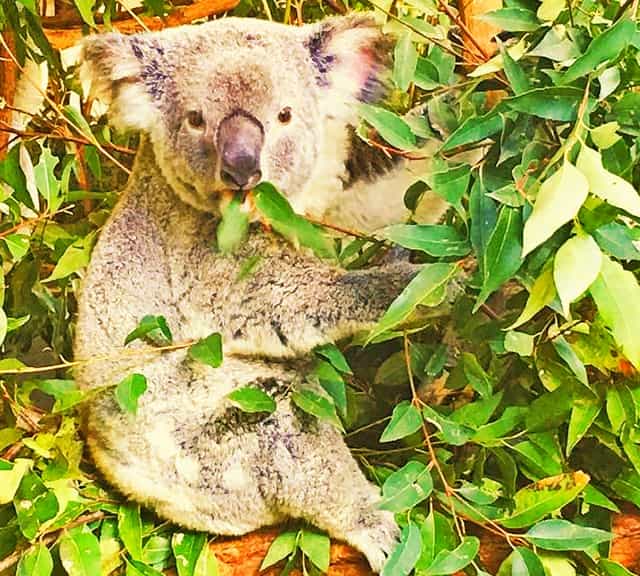
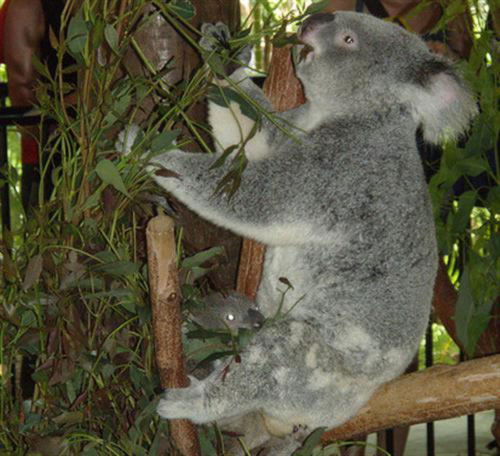
Koalas have developed a good sense of smell for choosing the Eucalyptus leaves as part of their diet. Koalas can easily differentiate fresh Eucalyptus leaves from the other ones and mostly prefer the fresh Eucalyptus leaves. They smell nitrogen within the leaves and differentiate the fresh ones from the non-fresh ones, as fresh leaves contain more levels of nitrogen.
Koalas have developed a good sense of smell which allows them to have the best selection of Eucalyptus leaves for their diet.
These fresh leaves contain high source of water and energy levels as compared to the older (adult) leaves. Similarly; in some seasons when the toxicity and poison levels are high within the Eucalyptus leaves, the koalas can easily be able to identify them and avoid them as well.
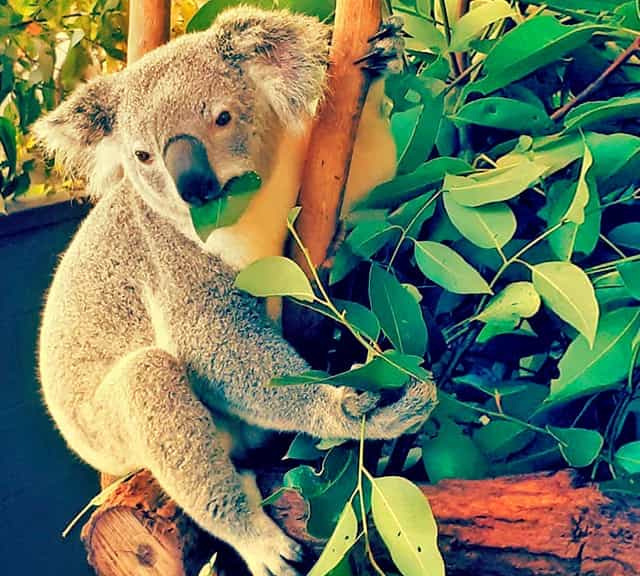
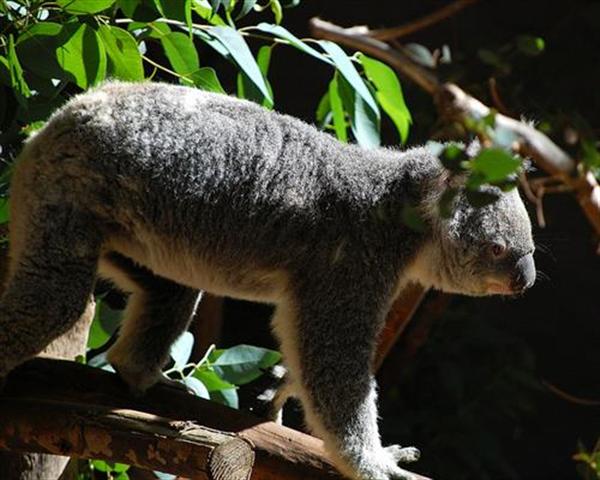
Koalas usually consume around 200 to 400 grams of Eucalyptus leaves per day which is not much. Furthermore; this consumption is very little as compared to the other herbivore animals' consumption when compared with their body mass. As a matter of fact, the koalas have limited amount of body energy. This is also one of the basic reasons that the koalas sleep more than 20 hours (in some cases 22 hours) per day, as it allows them to retain and conserve their body energy. But there is another valuable reason to explain about the little Eucalyptus consumption of the koalas which is related to the fiber contents within the Eucalyptus foliage.
Koalas only consume around 200 to 400 grams of Eucalyptus leaves per day because of the high fiber contents within Eucalyptus leaves.
Eucalyptus leaves have high fiber contents, therefore; even after consuming little amounts, the stomach of the koalas gets full and they need to digest it which takes a lot of time. According to the estimates, Eucalyptus fiber is 6 times more fibrous and less caloric than the normal bread fiber. Therefore; high fiber contents within the Eucalyptus leaves allow the koalas to eat less Eucalyptus and sleep more to digest them to extract energy.
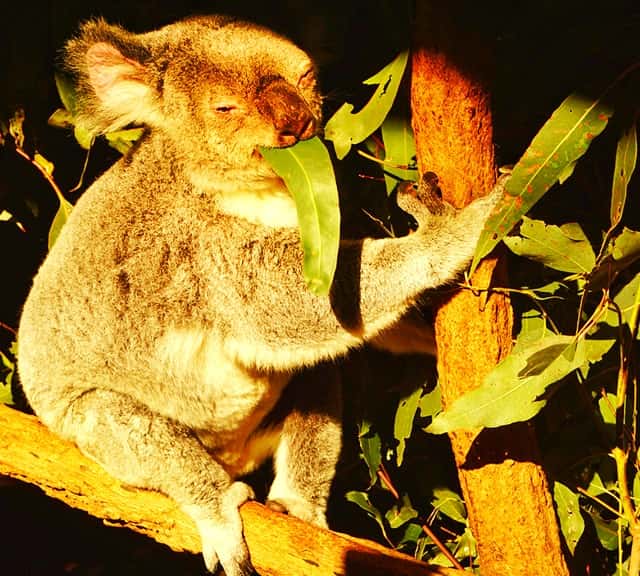
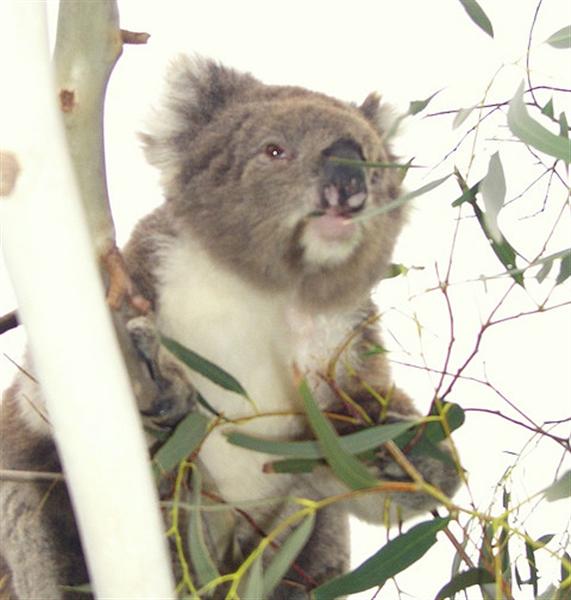
If the Eucalyptus leaves are very high in poisons and toxic substances then how is it possible that an animal like koala digest them and maintains a normal lifestyle? Are the Koalas immune to the Eucalyptus toxics and poisons? Absolutely so! Whereas; the precise answer to the first question is the presence of specialized digestive and intestinal system within the koalas which helps them to extract all the nutrients and energy from the leaves and excrete the poisons and toxic substances out of their bodies.
Koalas have a very specialized digestive and intestinal system which extracts all the nutrients through the fermentation of the Eucalyptus leaves.
These nutrients are extracted through fermentation of the Eucalyptus leaves while large and small intestinal cells of the Koalas extract and absorb these nutrients to produce energy. Since koalas have very small brain and liver, therefore; their energy consumption and energy loss are a lot less as compared to the other herbivore animals. Some researcher have also argued that fermentation also produces alcohols in koalas and that's why they are lazy and sleepy but no significant findings have been yet been made about such claims.
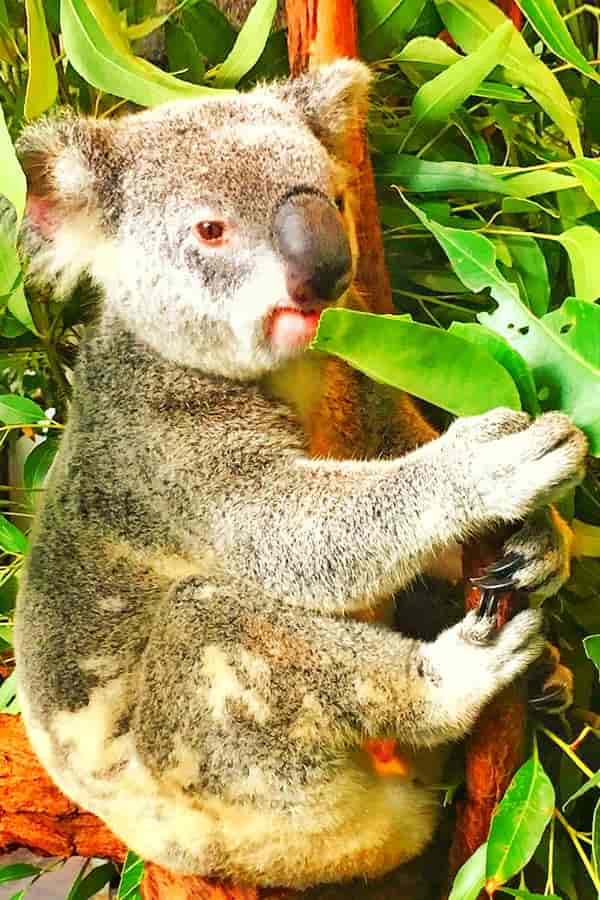
Only the properly chewed Eucalyptus leaves help koalas to gain energy and nutrition while digestion. Proper chewing of leaves improves the fermentation process. Poorly chewed leaves reduces the efficiency of the fermentation process and thus less nutrition and energy is extracted by the koalas. When the koalas become old their tooth start to decay.
Older koalas lose their teeth because of tooth decaying over the time. This reduces fermentation of eucalyptus while digestion and thus the koalas die because of nutritional failure and starvation.
Tooth decaying makes an adverse impact on the chewing of the Eucalyptus leaves and therefore; less nutritional values and even energy is extracted by the older koalas. Consequently; they become weaker and weaker and reach a certain point in their lives where they are believed to face death because of nutritional failures and starvation.
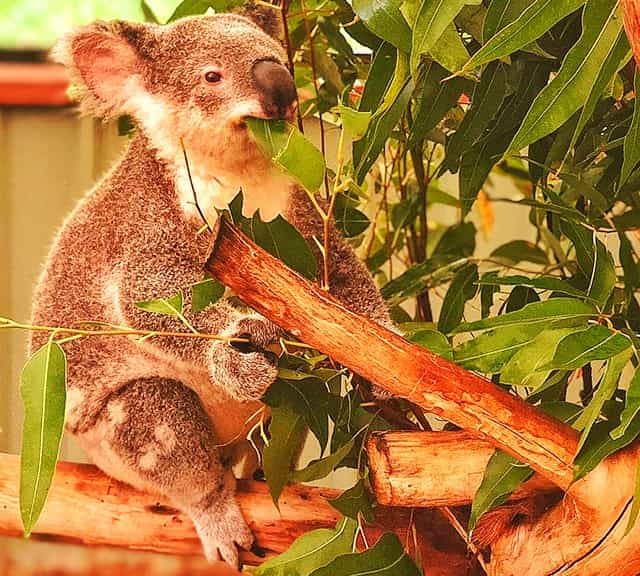
Since; the koalas are only dependent on the Eucalyptus leaves for their diet, therefore; any habitat loss of the Eucalyptus trees can be a big disaster for them. Eucalyptus have thrived within the Eastern Australian region for the millions of years and they are known to be drought resistant as well. Therefore; naturally there is no threat to the habitat loss of the Eucalyptus leaves for the koalas. However; rapid urban development within Eastern Australian regions is severely impacting the habitat loss for the koalas.
Habitat loss of the Eucalyptus trees means death for the koalas and a possible extinction as well. Therefore; conservation of the Eucalyptuses is the only way forward to save the koalas.
Thousands of trees are cut for the purpose of timber or housing societies while koalas are forced to either leave or die of starvation or get hunted. Even though the Australian Governments have taken key steps to ensure the koalas' habitat yet still, the Eucalyptus habitat is continuously threatened for the koalas on the daily basis.
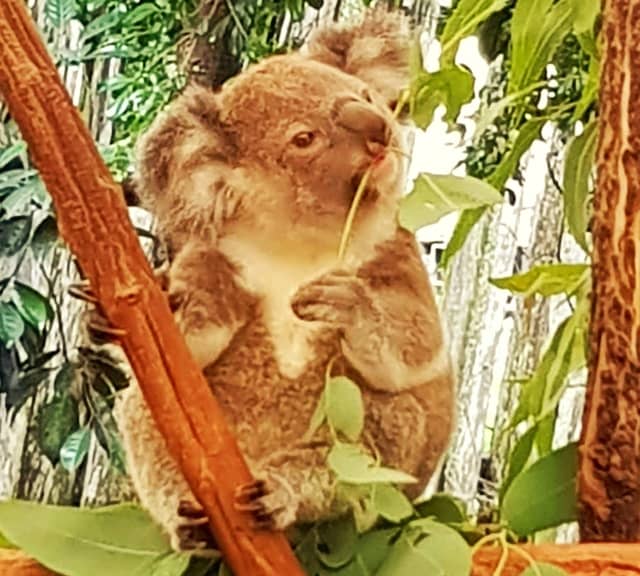
Liger Articles
Marsupials vs. Placental Mammals
Koalas are most popular animals in Australia
Koalas are more popular as compared to Kangaroos
Koalas and their Dominant Nose
Button Shaped Fascinating Eyes of the Koalas
Core Recognizing Features of Koalas
Koalas are the largest tree climbing Mammals in Australia - Koalas as Arboreal
Sizes of Koalas from Queensland, Australia
Sizes of Koalas from Australia's Victorian Origin
Difference between Queensland and Victorian Koalas
Average Weights of Male Koalas
Weighing Male vs Female Koalas
Male Koalas have Loudest of voice among all Australian Mammals
Origin of Koalas & their Evolution
Koalas Population Increased at the end of 20th century
Historical Evolution of the Koalas - A Physical Perspective
Koalas and their Aboriginal and Native Names
It Took 10 years for Aboriginal Australians to Spot and Recognize Koalas
Koalas Live Hardest and Toughest Lives Among all animals
Koalas Tooth Decay through its Abrasive Diet
Koalas Diet is Fully Poisonous and Toxic
Koalas' Food Eucalyptus has Lower Nutrition
Koalas have Lower Energy Levels
Koalas - When Occasionally Spotted on other Leaves for their Food
Why Koalas drink little or no Water?
Koalas & their Advanced Digestive Mechanisms
Why Koalas Sleep more than 20 Hours a Day?
Koalas Lack Energy and Strength
Koala's Tooth from Growth till Tooth Decay
Young Koalas are Better Chewers as Compared to Mature and Elderly Koalas
Why Most Koalas Die of Starvation?
Heat Exhaustion and Heat Strokes among Koalas
Do Koalas lack Intellectual Abilities?
Koalas and their Sense of Smell
Koalas Love Fresh Eucalyptus Leaves as their Food
Koalas' Eucalyptus Leaves' Preferences during summers and Winters
Koalas' Preference for Leaves Having Higher Nitrogen Levels
Koalas Prefer Big Eucalyptus Trees and Love to Stay at Trees' tops.
Koalas Prefer to Live in Areas that have Good Soil and Fertile Lands
Koalas' Per Day Food Consumption
Koalas Food Consumption Depends upon their Body Size
Lactating Female Koalas Consume More Food as Compared to the Normal Female Koalas
Koalas Consume More Food during Winters as Compared to Summers
Female Koalas are very Selective Regarding their Leaf Selection and Food Consumption.
A Baby Koala Joey Lives in her Mother's Pouch for 8 to 9 Months
Gestation Period within Female Koalas
Breeding Behaviors of the Female Koalas
The Size of the Baby Koala Joey at the time of its Birth
Weight of the Baby Koala Joey at the Time of its Birth
At Birth the Baby Koala Joey Travels from Cloaca into their Mother's Pouch
Newborn Koala Joeys have Well-Established Sense of Smell
Koala Joey keeps his Head Inside its Mother's Pouch for 6 Months
Complete Shape and Body Development of the Koala Joey
Pap - The first solid food of the Koala Joeys
When Does Tooth Emerge for Baby Koala Joey?
Aggressive Behavior of Mother Koalas towards their Joeys
Queensland Offers Less Nutritional Values for Koalas
How long does Koalas live? Age of the Koala
Female Koalas Live More than Male Koalas
What is the Average Age of the Male Koala?
Average Ages of the Female Koalas
For How Long a Female Koala can Give Birth to the Koala Joeys?
How many times female Koalas give birth?
Koalas and Australia's Bushfire
Koalas' fur quickly gets rid of rain water
Koalas Resting and Sleeping Postures and Positions during the Hot Summer Seasons
Winter Season and Sleeping Postures of Koalas
Koalas' Urination during Summer and Winter Seasons
Koalas and their Specialized Claws
How does a Koala regulate its Body Temperature?
Food Consumption and Feeding Timings of the Koalas
Koalas Always Prefer Eucalyptus Leaves from the Tree top
How does a Koala Grooms itself?
Koalas' Territories and ranges within Australia's Victorian Areas
Koalas' Territories and Ranges within Australia's Queensland Areas
Behavior of the Alpha Dominant Male Koala
Aggressiveness of Female Koalas
Scent Marking Behavior of the Male Koalas
Mating Strategy of the Male Koalas
Fights and Territorial Encounters of Male Koalas
Sounds and Vocalizations of Male Koalas
Sounds and Vocalization of the Female Koalas
Koalas and their Facial Expressions
Breeding Ages of the Male and Female Koalas
Factors Influencing the Success of Koalas' Fertility Rates
Behavior of the young and adolescent Koala Joey
When Does a Mother Koala Says Goodbye and Leaves the Young Koala Joey?
Playful Behavior of the Young Koala Joeys
Koalas - Mating Season and Mating Months
Koala Informationen, Bilder, Neuigkeit, und Erforschung
Коала - сумчатый млекопитающий